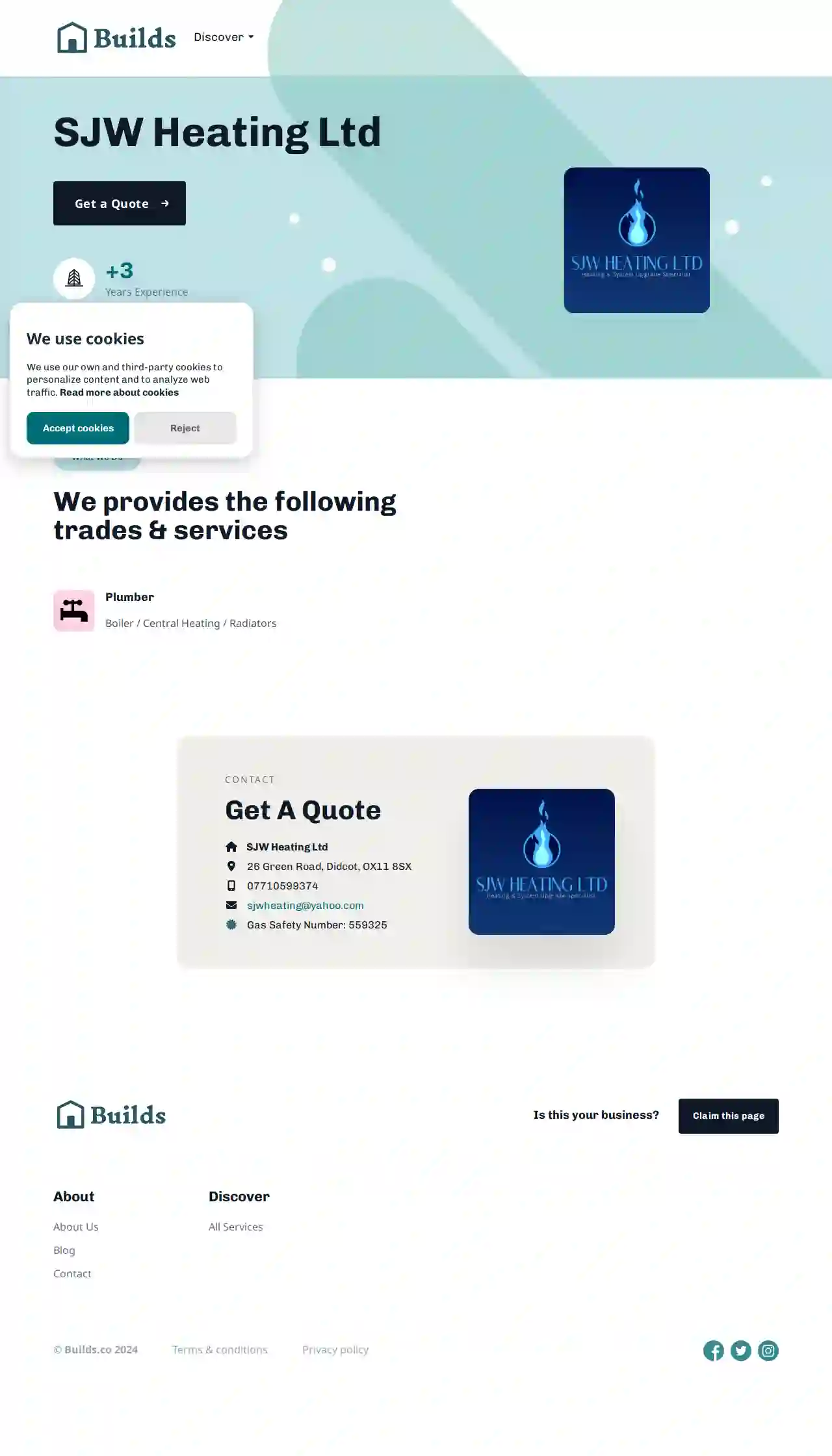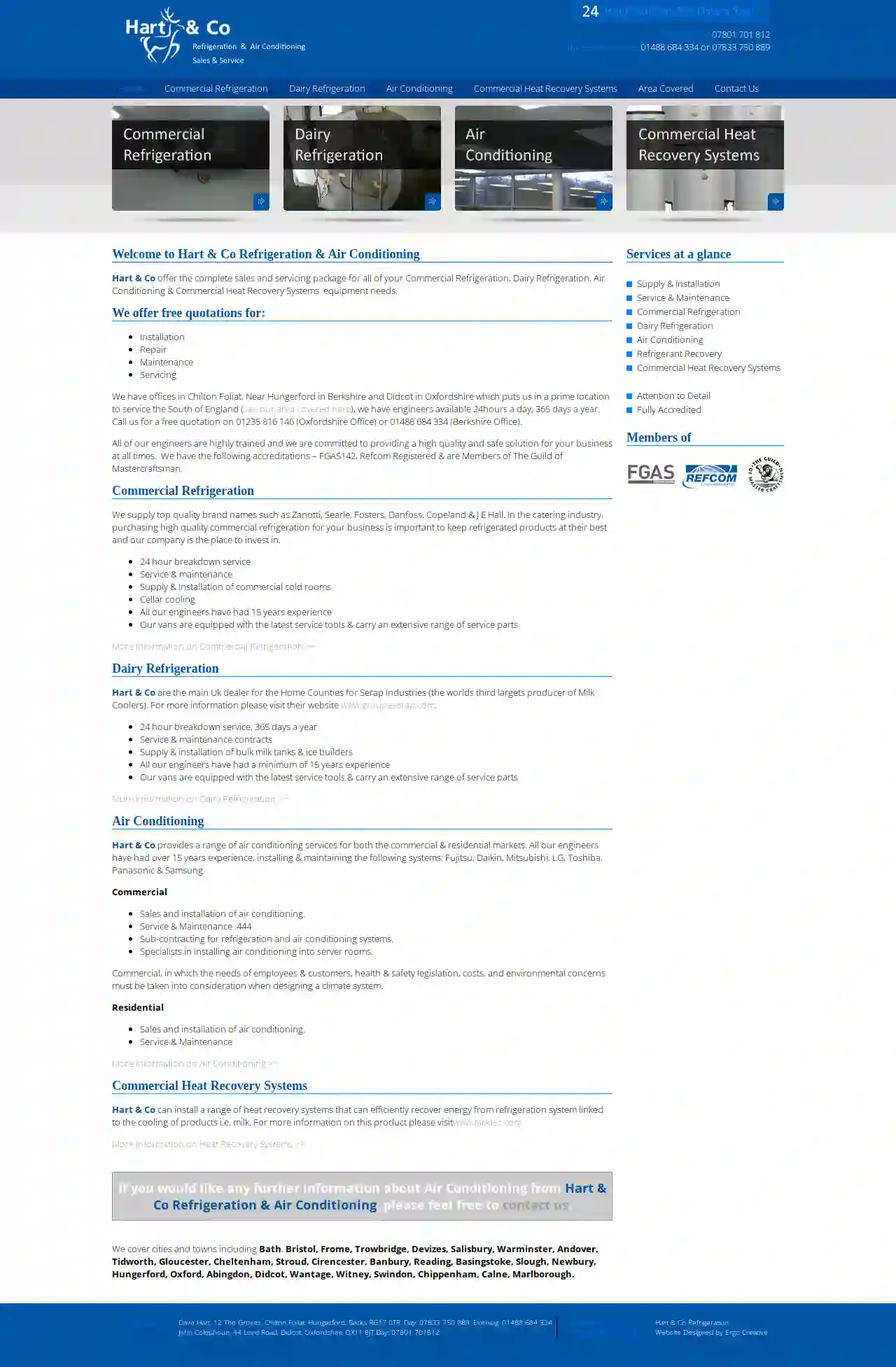Furnace Repair Didcot
Top 10 Furnace Repair in Didcot
Receive 3 FREE Furnace Repair quotes for your project today! Compare profiles, reviews, accreditations, portfolio, etc... and choose the best service.

SJW Heating Ltd
126 Green Road, Didcot, OX11 8SX, GBAt Builds.co, we are a reliable online job market for local and highly-skilled construction tradesmen. We connect homeowners in need to the skilled tradesperson who's capable of doing the job in the most stress-free way possible. Our mission is to make it almost instant for homeowners to find the right expert and access a pool of highly-skilled tradespeople who specialise in their specific need. For skilled tradespeople, we aim to become the leading tradesman job market who will be your springboard to starting and building your own tradesmen business. We provide a peace of mind solution for homeowners, knowing their home is in good hands with our trusted tradespeople.
- Services
- Why Us?
- Gallery
Get Quote
Hart & Co Refrigeration & Air Conditioning Ltd
1Didcot, 44 Loyd Road, OX11 8JT, GBWelcome to Hart & Co Refrigeration & Air Conditioning. Hart & Co offer the complete sales and servicing package for all of your Commercial Refrigeration, Dairy Refrigeration, Air Conditioning & Commercial Heat Recovery Systems equipment needs. We have offices in Chilton Foliat, Near Hungerford in Berkshire and Didcot in Oxfordshire which puts us in a prime location to service the South of England. We have engineers available 24hours a day, 365 days a year. All of our engineers are highly trained and we are committed to providing a high quality and safe solution for your business at all times. We have the following accreditations – FGAS142, Refcom Registered & are Members of The Guild of Mastercraftsman.
- Services
- Why Us?
- Accreditations
- Our Team
- Gallery
Get Quote
SMS Environmental Ltd
4.212 reviewsDidcot, GB- Services
- Why Us?
Get Quote
Over 1,991+ HVAC Contractors on our platform
Our HVAC experts operate in Didcot and beyond!
HVACCompaniesHub has curated and vetted the Best HVAC Companies in Didcot. Find a top & trustworthy pro today.
Frequently Asked Questions about Furnace Repair
- Age: If your furnace is 15-20 years or older, it is likely less efficient and more prone to breakdowns.
- Frequent Repairs: If your furnace requires frequent and costly repairs, it may be a better financial decision to replace it than to continue fixing it.
- Increasing Energy Bills: A significant increase in your heating bills could indicate that your furnace is losing efficiency.
- Inconsistent Heating: Uneven temperatures throughout your home or business could mean your furnace is no longer distributing heat evenly.
- Strange Noises: Listen for odd noises coming from the unit.
- Yellow Flame: A healthy furnace flame should be blue. A yellow flame suggests the presence of carbon monoxide, which is a serious safety hazard. If you see a yellow flame, contact a qualified HVAC technician immediately.
- Dry Air: While not a direct indicator of malfunction, older furnaces can make your indoor air very dry.
- Pilot light or ignition problems: If the pilot light is out, the burners won't light, and the furnace won't produce heat. Ignition issues are a common culprit.
- Thermostat issues: A faulty thermostat can prevent the furnace from turning on or cause it to cycle improperly. Check your thermostat settings to ensure the system is set to 'heat' and the temperature setting is higher than the current room temperature.
- Overheating: If the furnace overheats, it could activate a limit switch. Overheating can also damage your furnace, so it's best to have a professional inspect the system.
- Ductwork problems: Seal any ductwork leaks to improve performance. Poorly insulated or leaky ducts can cause a variety of heating issues.
- Banging or popping: Could indicate dirty burners, delayed ignition, or expanding ducts.
- Squealing or screeching: Often indicates an issue with the blower motor or the inducer motor.
- Rumbling or vibrating: Check for loose parts or components.
- Clicking: May be from the igniter, but it can also come from other electrical problems If the clicking sound is persistent, it is best to contact an HVAC technician.
- Whining: Similar to squealing or screeching, this indicates an issue with a motor.
What are the signs that my furnace needs to be replaced?
Why is my furnace blowing cold air?
Why is my furnace making strange noises?
What is a pilot light?
What are the signs that my furnace needs to be replaced?
- Age: If your furnace is 15-20 years or older, it is likely less efficient and more prone to breakdowns.
- Frequent Repairs: If your furnace requires frequent and costly repairs, it may be more economical to replace it than to continue fixing it.
- Increasing Energy Bills: A significant increase in your heating bills could indicate that your furnace is losing efficiency.
- Inconsistent Heating: Uneven temperatures throughout your house could mean your furnace isn't functioning as it should.
- Strange Noises: Unusual sounds coming from your furnace, such as banging, squealing, or rumbling, can signal mechanical problems.
- Yellow Flame: A healthy furnace flame should be blue. A yellow flame suggests a problem with the burners or venting. If you see a yellow flame, contact a qualified HVAC technician right away.
- Dry Air: If you notice excessive dryness, a new furnace could provide increased comfort.
Why is my furnace blowing cold air?
- Pilot light or ignition problems: In older furnaces, the pilot light needs to be lit for the burners to ignite. Ignition issues are a common culprit.
- Thermostat issues: An incorrectly set or malfunctioning thermostat can prevent the furnace from turning on or make it blow cold air. Check your thermostat settings to ensure the system is set to 'heat' and the temperature setting is higher than the current room temperature.
- Overheating: If the furnace overheats, a safety switch may shut off the burners, causing the blower to circulate cold air.. This is typically caused by a restricted airflow, often due to a dirty air filter.
- Ductwork problems: Seal any ductwork leaks to improve performance. Poorly insulated or leaky ducts can cause a variety of heating issues.
Why is my furnace making strange noises?
- Banging or popping: Could be due to a buildup of sediment in the heat exchanger.
- Squealing or screeching: Often indicates an issue with the blower motor or the inducer motor.
- Rumbling or vibrating: Check for loose parts or components.
- Clicking: May be caused by a faulty igniter, control board, or other electrical components. If the clicking sound is persistent, it is best to contact an HVAC technician.
- Whining: Similar to squealing or screeching, this indicates an issue with a motor.